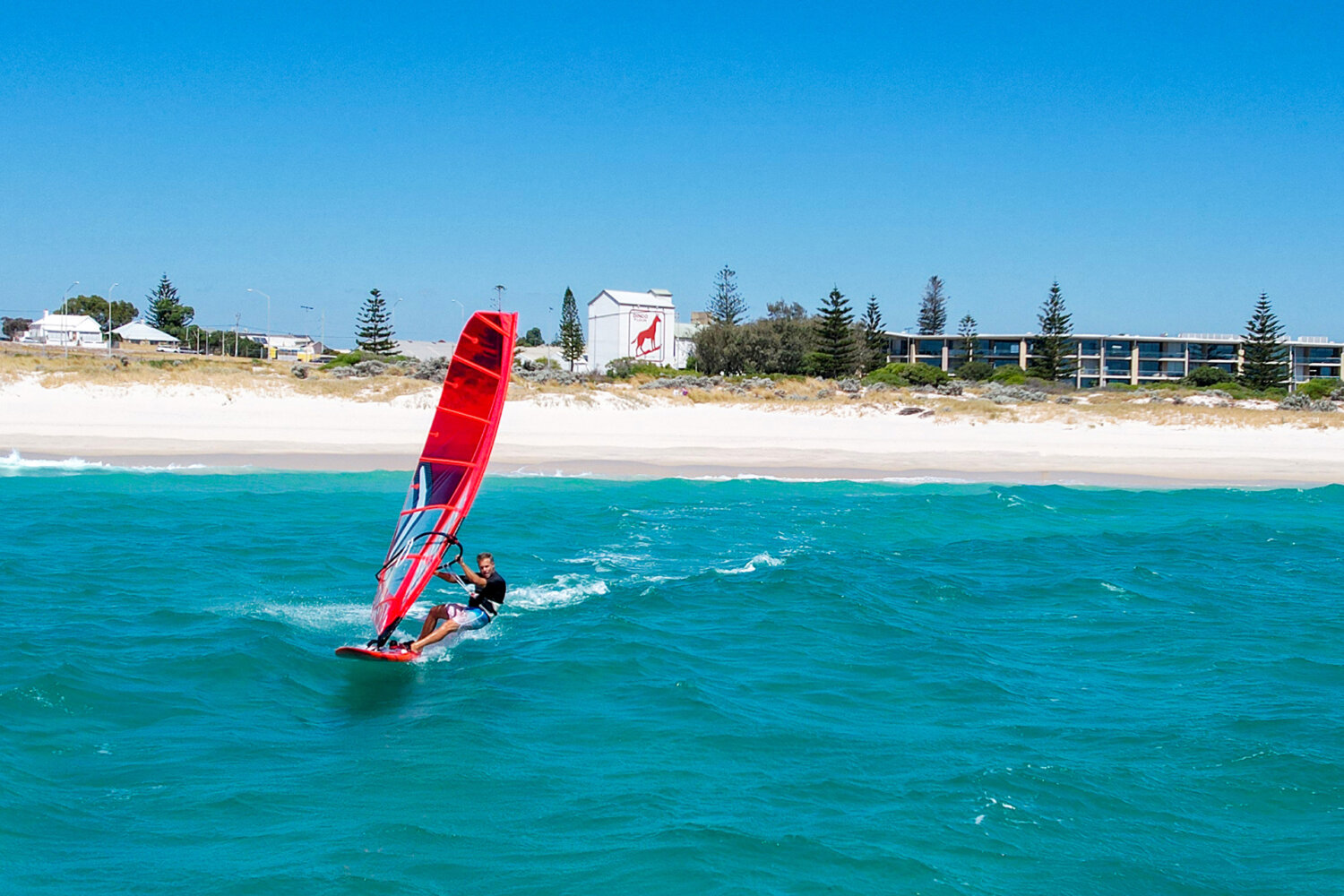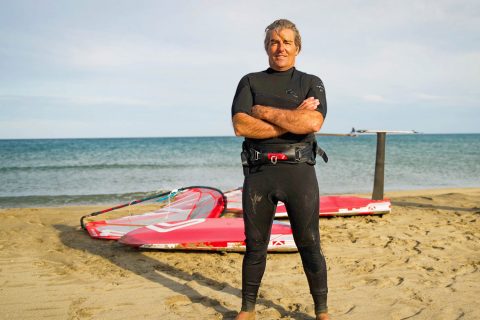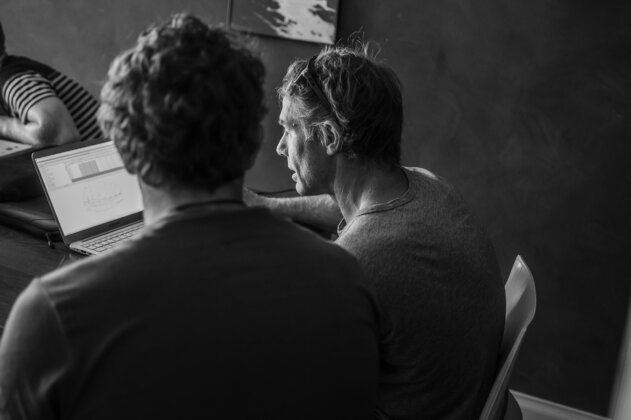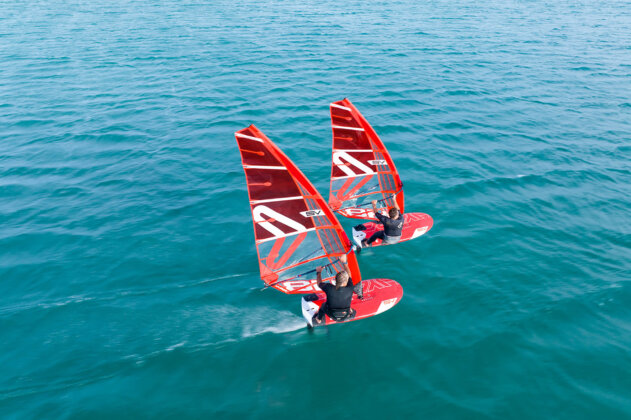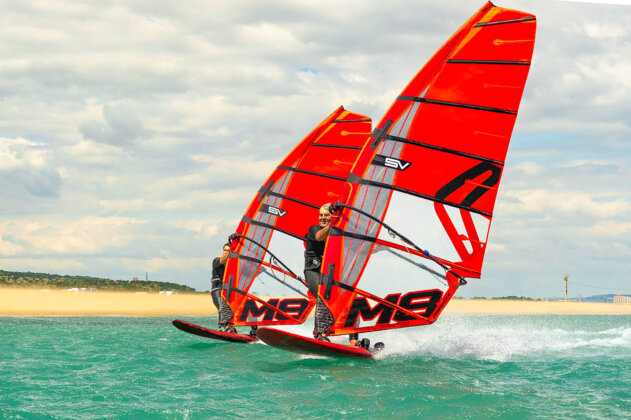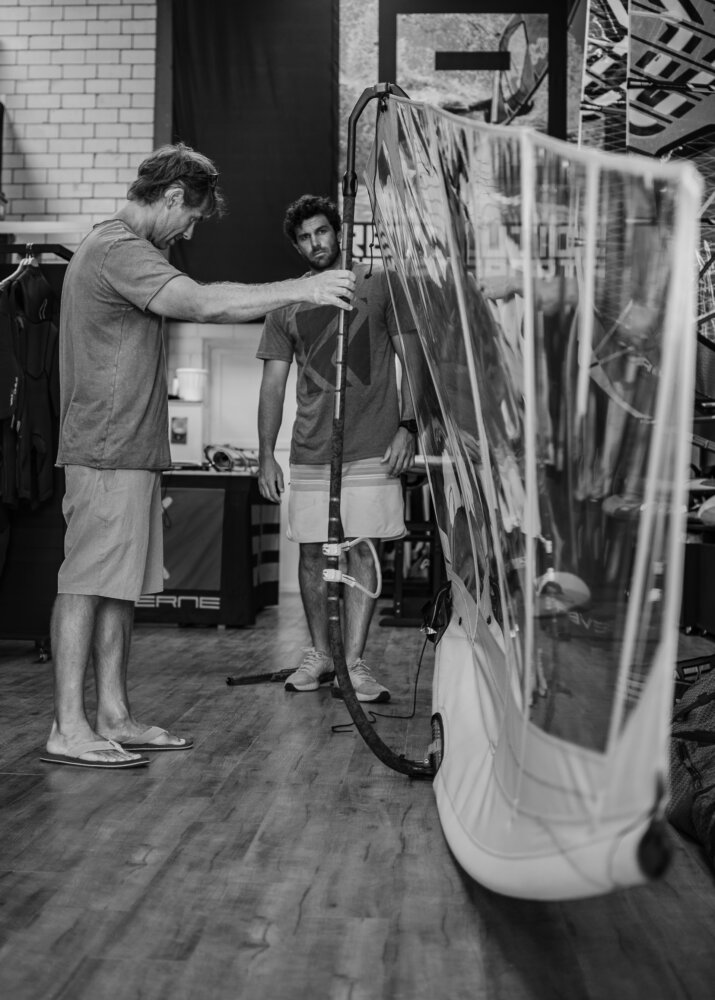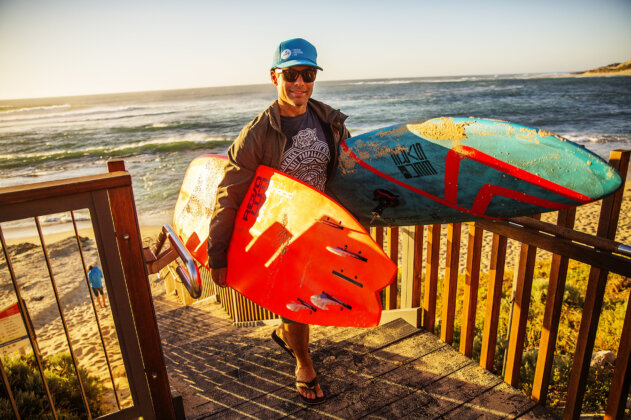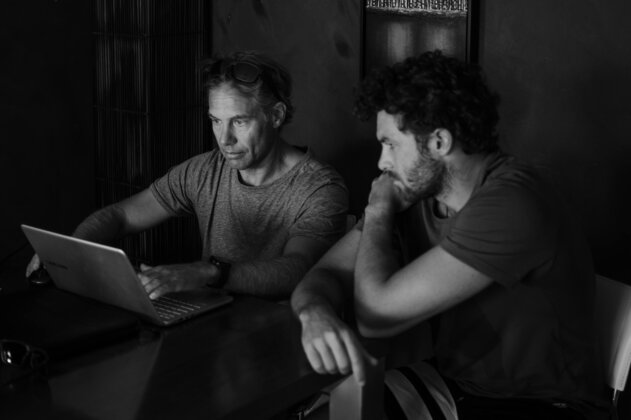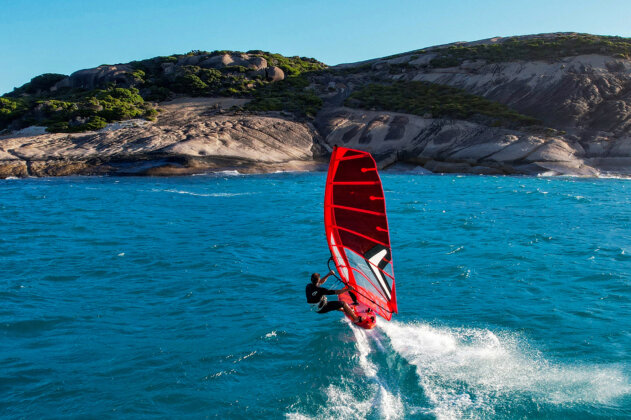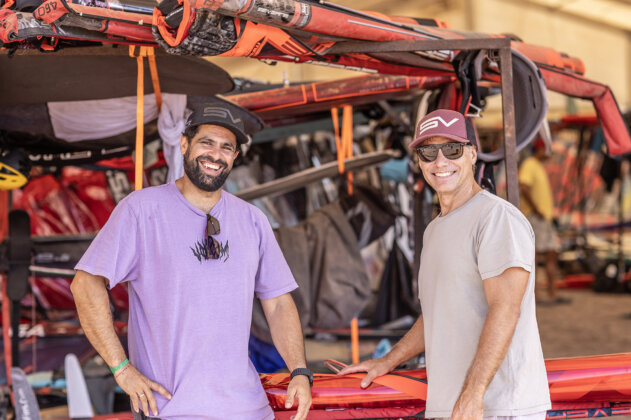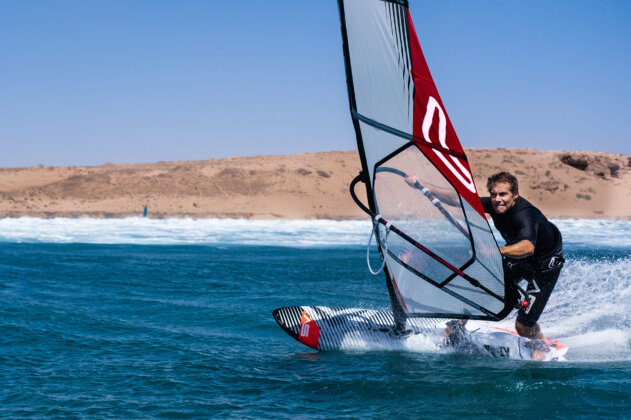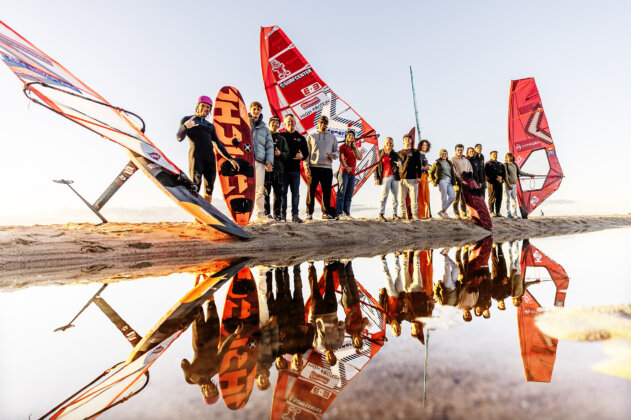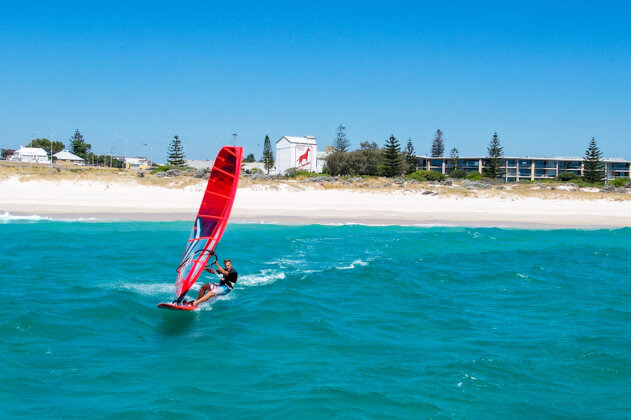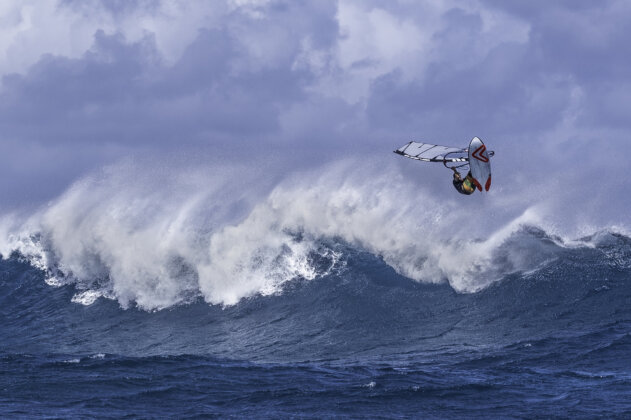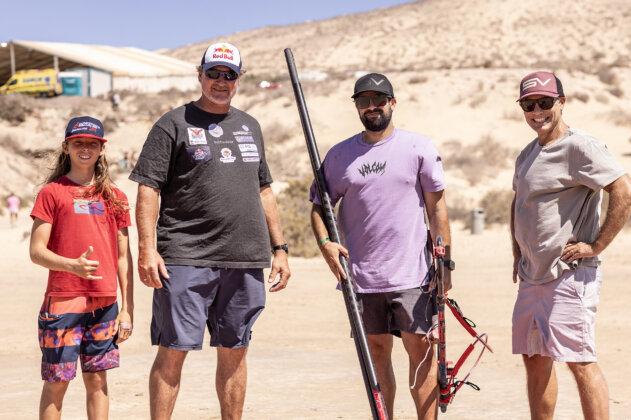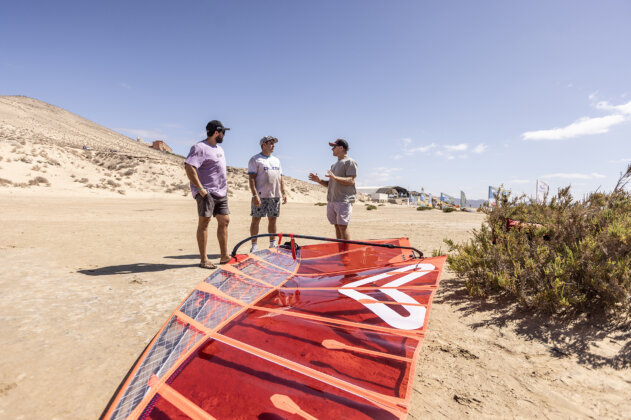BEN SEVERNE: THE PURSUIT OF EXCELLENCE
His name may be on the sails, but Ben Severne is anything but a frontman. Ben is creative force behind the Severne and he has built the brands reputation on innovation, precision and an uncompromising drive for performance. Far more comfortable in the sail loft than in the spotlight, Ben prefers to let his riders shine on the world stage while he quietly pushes design boundaries behind the scenes. Back home in Western Australia, however, he’s not just a designer…he’s a passionate sailor at heart, with an insatiable appetite for time on the water. We caught up with Ben for a brief chat during a whirlwind visit to the Fuerteventura World Cup, where he had flown in to connect with the team.
WINDSURF: Severne signed Antoine Albeau, to join the likes of Bjorn Dunkerbeck, Matteo Iachino (note this interview was done before Matteo Iachino left Severne last month) and Cedric Bordes… was that part of your decision to sign Albeau?
- Antoine Albeau
BS: Definitely not. I’m not left to any of those kinds of decisions…they tell me to cut and design the sales (Laughs). I prefer to stay behind the scenes and do the fun stuff. I leave all the complicated stuff, like dealing with team riders to Kurosh Kiani, while the sales are down to Thewes De Boer! I just play around in my shed designing sails.
- The work never stops
Having said that, we are a team. We do discuss whether a big decision sounds like a good idea or not and in this case a lot of influence came from Cedric Bordes. Cedric does huge amount of our testing now in the racing department. Most of the different projects usually go through Cedric and he’s quite good friends with good mates with Antoine, so it all started from there.
- The experience of Albeau on the team
For Severne, signing Antoine was just an incredible opportunity to acquire a whole lot of knowledge. He has so much experience working through all the different solutions when designing a sail. So that’s pretty helpful and it cuts down the risks of not making any mistakes. We now have a rider with a huge amount of knowledge about designing and testing sails and he knows what he needs to go fast, that can help point us in the right direction. It speeds up the whole process.
- Antoine and Cedric flying on the M8
WINDSURF: Are you going to design anything revolutionary for him to break the speed record or are you just refining the sails that you have already?
BS: Antoine is similar to Bjorn; they both want equipment that is easy to use! As soon as it’s gets difficult to sail, they are the first people to go, no, this is too stiff or it’s it is too difficult to control in the chop! These big guys are actually asking for the easiest, most functional design of a sail. That is quite interesting.
We’ve had smaller guys that are more determined to use difficult equipment, but the likes of Antoine and Bjorn prioritize, easy to use equipment, then their skill and technique shines through and you see the result.
- The pursuit of excellence
WINDSURF: So, your ethos now with Severne, is it still the same as it always was making the best equipment possible, as you guys also ride the gear yourselves?
BS: I think everything that we make, we get to get to play with, so I want it to be the best. There are some products that I would probably not choose to go sailing on, but the challenge of taking the knowledge from other areas of windsurfing and applying it, is very fun! When spend a lot of time designing the iQFOiL racing equipment…personally I’m never going to race an 8m in 25 knots! That is not for me, but to set it all up and make it as good as it can be, that’s quite a fun challenge.
- Testing boards in Margaret River
WINDSURF: Is speed an area of windsurf that interests you?
BS: Yeah, we play around with quite bit of that in Australia. There is surprising number of people that are into just going fast. No-one knows how to jibe in Australia, so straight lines are all we can do (Laughs)
- Behind the scenes with Matteo Iachino
WINDSURF: So, what about you yourself personally, you still windsurfing just as much as you ever were or?
BS: Basically, we are on the water every day in the summer or even in winter, we sail most days, there’s a lot of gear to test. I think the middle of winter in Australia, if it’s raining and it’s freezing cold and it’s onshore, maybe starts to feel like hard work, but still, I think it’s a pretty good job.
- A typical day for Ben?
WINDSURF: And, what’s a typical day in Australia for you then?
BS: I think there’s no such thing as a typical day in my life! Every day is different. We’re constantly getting sails to test, we’re getting boards and there’s parts for booms and even different kinds of down haul…it’s endless to just work through samples and prototypes and new ideas. One day I might be working on wetsuits and harnesses and the next day’s speed sails and fins!
The fun part is just having every single little piece under our control…right down to foot strap screws, customized fin screws, the parts on the booms and the batons in the sails, every single little detail provides a chance to experiment and come up with something better.
- Kurosh Kiani and Ben Severne in Fuerteventura
WINDSURF: You have got your team for all the marketing and sales, but do you like to keep your finger on the pulse of what they are up to?
BS: I am more involved in all the bits that we actually produce and sell. But I think we’re all involved. Kurosh Kiani is kind of the marketing guy, but he does a lot of testing. He is involved in every major design decision including all the sizes we are going to make etc. All the people that we work with are pretty experienced windsurfers and spend plenty of time on the water using the products.
- Ben at work
WINDSURF: Are you happy with the way Severne has grown and where it is now?
BS: I try not to look at it as a big beast if I can help it. The way that it’s going to succeed is if we just treat it like it’s the same old small business when it started! Ultimately, we are just building windsurfing equipment to enjoy windsurfing for ourselves and makes the best possible products for us to use on the water. I think looking at the success, just changes the way we might make a lot of the decisions. Even the way we would develop the product would change. I think it’s important to just make the best equipment for the fun of it, for the love of windsurfing! I like to keep working the way we’ve always done and stay consistent. I just look at how we can build equipment that makes windsurfing better!
- The Severne Team at Sylt in 2024
WINDSURF: On your typical season in Australia, are still doing those crazy road trips up to Gnaraloo, Exmouth and Margaret River.
BS: “I think nothing’s changed. There’s maybe a little bit more traffic, but if you have not been to Australia for a few years, you would not notice anything’s different. It’s exactly the same, same people doing the same shit. Some of the places are getting more crowded. That’s the problem. There is talk about less people windsurfing, but if you go to any of the places, you can’t get a car parking spot. That’s the reality in Australia at least! There are more people windsurfing now since as long as I can remember.
- Blasting in WA!
And for some reason we’ve had better seasons, the last two years have been the windiest, with swell all summer. It’s the best we’ve ever had and everywhere is packed. So yeah, I think that is good to see.
- Sailing comes first
WINDSURF: What what’s the most satisfying part of your job?
BS: Obviously the sailing.
- Checking in with the team in Fuerteventura
WINDSURF: What about seeing a happy customer?
BS: We like good feedback but there is always the fear of bad feedback. That’s more of a motivator, I think. Normally before we release a product, we’ve probably had at least a season testing it. I have always got a big van full of gear and quite a few guys on it testing with me. If I’ve got 4 or 5 different boards in the back of the van and I consistently go to one board, then normally that’s the one! That will be be stage one! Then we’ll get a few of those boards with a couple of other people riding them. If they have the same feelings of what we’re trying to do, it goes from there.
- Looking at protos in Fuerte
So, I think by the time a product goes into production, everyone’s got a very clear idea of what it is. We normally understand exactly where the concept is coming from and we know what the board or the sail does and we have a clear understanding of what we’re trying to achieve. So, at the end of the process there’s not many surprises.

